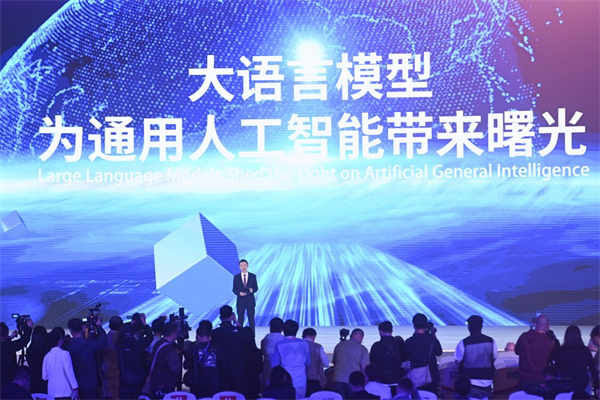
- Home
- Media Center
-
Events
- Wuzhen Summit
- Regional Forums
- Practice Cases of Jointly Building a Community with a Shared Future in Cyberspace
- World Internet Conference Awards for Pioneering Science and Technology
- The Light of Internet Expo
- Straight to Wuzhen Competition
- Global Youth Leadership Program
- WIC Distinguished Contribution Award
- Membership
- Research & Cooperation
- Digital Academy
-
Reports
- Collection of cases on Jointly Building a Community with a Shared Future in Cyberspace
- Collection of Shortlisted Achievements of World Internet Conference Awards for Pioneering Science and Technology
- Reports on Artificial Intelligence
- Reports on Cross—Border E—Commerce
- Reports on Data
- Outcomes of Think Tank Cooperation Program
- Series on Sovereignty in Cyberspace Theory and Practice
- Other Achievements
- About WIC
- 中文 | EN

Industry experts call for AI governance, cooperation

A speaker presents large language models during the 2023 World Internet Conference Wuzhen Summit in the town of Wuzhen in east China's Zhejiang Province, Nov. 8, 2023. (Xinhua/Huang Zongzhi)
BEIJING -- As artificial intelligence (AI) technologies are developing rapidly in China and reshaping people's lives, issues such as AI security, controllability and equity have become the concern of the AI industry.
During the 2023 World Internet Conference Wuzhen Summit which concluded Friday in east China's Zhejiang Province, many companies and experts discussed the AI development and the potential challenges, calling for a governance mechanism to better steer the future of AI technologies.
During a speech, Yang Yuanqing, Lenovo Group's chairman and CEO, said that the generative AI and the large language models have become accelerators and catalysts for the wide use of AI technologies, bringing efficiency and convenience to society. However, there are still some challenges to be addressed, particularly in ensuring privacy protection and data security while promoting productivity, he noted.
Zhou Hongyi, founder of Chinese internet security firm Qihoo 360, said it is necessary to strengthen cybersecurity technology innovation, build public service security platforms, and provide more services and products to enhance data security and protect personal information.
These concerns regarding data security and privacy were also echoed by Ji Weidong, dean of the China Institute for Socio-Legal Studies affiliated with Shanghai Jiao Tong University.
"The large language model can retrieve more personal information and compromise privacy than the existing internet search engines when providing network dialogue services," he said.
According to Wu Shenkuo, vice director of the Internet Society of China Research Center, AI is a new field in human development, bringing major opportunities, but also unpredictable risks and challenges.
He noted that China has put forward the Global Initiative for AI Governance, which systematically elaborated the country's AI governance plan from three aspects -- AI development, security and governance.
All parties should work together to implement this initiative, which will help properly cope with the conflict of rules, social risks and ethical challenges brought by sci-tech development, Wu said.
China launched the initiative during the third Belt and Road Forum for International Cooperation held in Beijing in October, calling on countries to strengthen exchanges and cooperation, jointly prevent risks, and continuously improve the security, reliability, controllability and equity of AI technologies.
It has lent support to efforts aimed at developing AI governance frameworks, norms and standards based on broad consensus, with full respect for policies and practices among countries. Additionally, it advocates for discussions within the United Nations framework to establish an international institution dedicated to governing AI.
The AI governance initiative also emphasized the need for collaborative efforts and assistance to developing countries to bridge the gap in AI and enhance their governance capacity in this field.
Zhu Rongsheng, an expert from the Center For International Security And Strategy, Tsinghua University, told Xinhua that one of the most challenging aspects of AI governance is the lack of international consensus. The initiative put forward by China has provided important public goods for the international community to discuss the matter.
The initiative is of great significance for developing countries to participate in AI global governance. It enhances their voice in AI global governance, and ensures equitable rights, opportunities and rules for AI development and governance in all countries, Zhu added.

The World Internet Conference (WIC) was established as an international organization on July 12, 2022, headquartered in Beijing, China. It was jointly initiated by Global System for Mobile Communication Association (GSMA), National Computer Network Emergency Response Technical Team/Coordination Center of China (CNCERT), China Internet Network Information Center (CNNIC), Alibaba Group, Tencent, and Zhijiang Lab.





